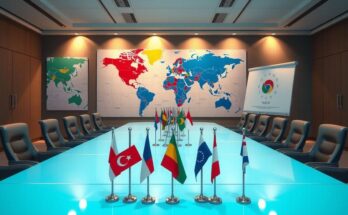Ghana’s former president John Dramani Mahama was declared the winner of the presidential election with 56.5% of the votes. His victory reflects widespread public discontent with the economic challenges faced by the ruling party, as indicated by both Mahama’s campaign promises and the reactions of voters. Mahama’s National Democratic Congress also secured majority control in parliament amidst the celebrations of his supporters.
On Monday evening, John Dramani Mahama, Ghana’s former president, was declared the winner of the presidential election. Mahama garnered 6.3 million votes, equating to 56.5% of the votes cast, amidst widespread dissatisfaction regarding the government’s economic management. His principal rival, Vice President Mahamudu Bawumia, acknowledged his defeat, receiving 4.6 million votes or 41%. Mahama characterized his victory as “emphatic” and vowed to “reset” the nation, focusing on economic recovery and appealing notably to the youth. Following the results, celebrations erupted among Mahama’s supporters, particularly in the capital, where adherents donned the opposition’s colors and engaged in exuberant festivities.
This election unfolds against the backdrop of Ghana’s significant economic difficulties, described as the worst cost-of-living crisis seen in a generation. The election not only served to elect the president but also assessed the public’s sentiment towards the ruling New Patriotic Party, under which opposition parties, particularly Mahama’s National Democratic Congress, gained popularity. The context of regional instability accentuated the importance of this election, as it served as a litmus test for Ghana’s democratic health amid the rising tide of extremism and military coups in West Africa.
In summary, John Dramani Mahama’s victory in Ghana’s recent presidential election reflects a broader global trend of opposition parties rising against incumbent governments, particularly in the face of economic hardship. His commitment to addressing the economic crisis has resonated with voters, leading to significant changes in both the presidency and parliamentary representation. The peaceful election proceeded under the watchful eye of the regional bloc ECOWAS, bolstering Ghana’s reputation for democratic stability despite the challenges at hand.
Original Source: www.usnews.com




